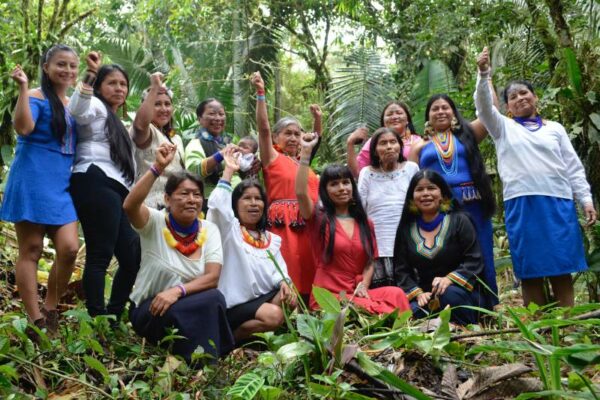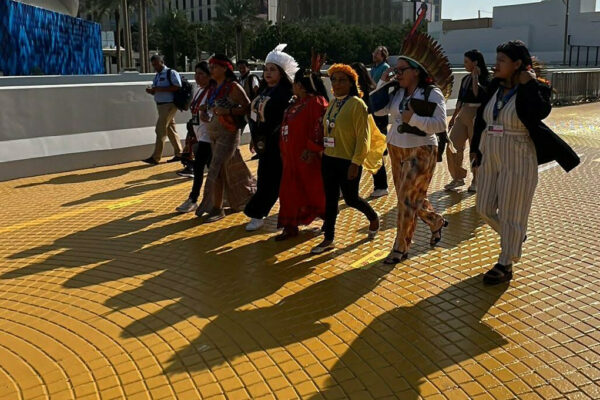Ramiro Cavero Uriona, Minister
Hernán Cabrera, Vice-Minister
Ministry of Sustainable Development and Planning
Av. Mariscal Santa Cruz Esq. Oruro
Edificio de la Ex-Comibol 6 Piso
Casilla 12814
La Paz
Bolivia
Dear Mr. Cavero Uriona and Mr. Cabrera,
We, the undersigned groups, respectfully call upon you to conduct a transparent audit of the Rio San Miguel – Cuiabá gas pipeline, as solicited by the indigenous organization Coordinadora de Pueblos Étnicos de Santa Cruz (CPESC).
As you are aware, a number of articles have recently emerged in the international press that demonstrate serious unresolved issues related to the pipeline. Among the most critical issues are the following:
1) Chiquitano Forest Conservation Program
As you know, the creation of the conservation program, which was negotiated privately by World Wildlife Fund, Wildlife Conservation Society, Missouri Botanical Garden, Fundación Amigos de la Naturaleza, and Museo Noel Kempff Mercado, helped convince the Overseas Private Investment Corporation to finance construction of the pipeline through the middle of the Chiquitano Forest. Unfortunately, three years later, the Board of Directors of the program does not include indigenous representatives, and is questionably comprised of representatives of Enron, Shell, and four of the aforementioned conservation organizations. As you likely know, World Wildlife Fund withdrew from the program, citing lack of transparency and local involvement. Tragically, the program has generated tremendous social conflict, and, ironically, as currently structured, constitutes a risk to the sustainability of the forest. We are disturbed to learn that the program continues to operate in Bolivia, despite recommendations from the Public Defender and Santa Cruz Departmental Counsel to reorient the program such that it respects the law and rights of indigenous peoples. In this context, we request that your Ministry suspend the activities of the conservation program, and require Enron and Shell to re-orient it in the manner proposed by CPESC.
2) Failure on the Part of Enron, Shell and OPIC to Comply with the Indigenous Development Plan
As part of the Indigenous Development Plan, Enron and Shell were to provide financial and technical support for land titling of indigenous communities affected by the pipeline. We are extremely concerned that the vast majority of indigenous communities have not received title to their lands. We hold Enron and Shell accountable for not fulfilling these obligations, and consider OPIC responsible for not requiring the companies to do so:
“The Project shall implement and comply with the Environmental Management and Monitoring Plan, the Environmental and Social Management System, the Conservation Plan, and the Indigenous Peoples Development Plans.”
(OPIC, 1999: “Summary of Environmental Conditions in the Cuiabá Project Loan Agreement”)
Therefore, we ask you to ensure that Enron and Shell obey the Environmental Law and comply with the Environmental License your Ministry granted, which includes the Indigenous Development Plan (PDI), which states:
“2.5 …This PDI is a component of the EIA (Environmental Impact Assessment) of the rio San Miguel – San Matias Pipeline”
..
“5.2 With respect to the Program of Support for Land Titling, cited in the above number, GasOriente Boliviano [a consortium of Enron and Shell] agrees to finance the cost required to contract for land titling of the lands of the thirty eight (38) Indigenous Communities that are considered and whose location appears described in the PDI…”
..
“4.1.3 Support the consolidation and titling of communal lands in such a manner that land tenure is guaranteed in the medium and long term”
(Agreement for the execution of the Indigenous Development Plan)
We are particularly concerned about reports that the companies are refusing to pay the full costs associated with land titling, such as the Native Communal Territory (TCO) requested by the local indigenous organization CIRPAS. We believe that regardless of whether or not the companies negotiated a side deal to limit the amount of money they would contribute towards this TCO, they should be obligated to pay all costs involved in land titling, whether or not communities choose to have a TCO or simple land titles.
With regards to the other components of the Indigenous Development Plan, it has come to our attention that there are serious problems that still exist. We are extremely troubled that the program has lead to social inequality amongst communities because its duration is only two years, and since Enron and Shell have not fully implemented its components. For example, the program was to create a rotating fund to benefit all indigenous peoples participating in the program, but community members have reported that only some of the families have been compensated. Contrary to what company representatives maintain, the Handicrafts and Agriculture components have not been fully and properly implemented. Given the fact that the pipeline is expected to continue to operate for 40 years, we believe the companies should extend the Indigenous Development Plan indefinitely as long as the pipeline remains in operation and continues to cause negative social and environmental impacts, such as those described in the next section.
3) Emerging Secondary Impacts
Recent articles in the press have reported a number of secondary environmental impacts caused by the pipeline. Local community members have witnessed illegal logging, hunting, and roaming cattle on the pipeline right of way. Furthermore, recent press releases from Orvana Minerals indicate that the company has re-opened the Don Mario Gold Mine in the Chiquitano Forest. A company press release states that it has solicited an environmental license from the Bolivian government to extract gas (presumably from the Cuiabá pipeline) and to construct a 5-kilometer pipeline to connect to the (Cuiabá) pipeline, crossing the Chiquitano Forest, which would be a flagrant violation of the environmental license and original Environmental Impact Assessment (EIA). As you know, Comsur bought Orvana Minerals and now controls it, and Presidential candidate Gonzalo Sanchez de Lozada is the new Chairman of the Board. This would generate serious secondary and cumulative impacts not contemplated in the original EIA. Consequently, we respectfully request that your Ministry not grant a license for the project.
In addition, considering the severity of these emerging secondary impacts, we consider it all the more imperative that your Ministry conduct a transparent audit in order to assess damages, sanction those responsible, and indemnify affected populations. This would also entail an assessment of past and current direct impacts, many of which have been documented in reports conducted by indigenous groups and non-governmental organizations. We sincerely hope you will ensure that Enron and Shell comply with the law by preventing and mitigating such impacts.
Considering the aforementioned issues, we are shocked to learn that the Inter-American Development Bank and Andean Development Corporation are about to loan over $US 125 million to Enron and Shell for expansion of the YABOG pipeline in Bolivia. Ironically, prior to construction, OPIC, Enron, and Shell promised that the Cuiabá pipeline would be a ‘world class project’ and include ‘unprecedented safeguards’ to protect the biodiverse Chiquitano Forest and local indigenous communities. Three years after OPIC’s approval of a $200 million loan to Enron and Shell, serious social conflicts have emerged, and the pipeline has opened up the Chiquitano Forest to encroaching development. In this context, it is clear that the project is truly a ‘world class disaster.” Therefore, we hope that the case of the Cuiabá pipeline will serve to remind your Ministry that these sorts of egregious projects, which threaten indigenous lands and ecologically sensitive areas, should never be authorized.
Thank you for your consideration.
Sincerely,
Derrick Hindery, Bolivia Coordinator, Amazon Watch
Ricardo Navarro, Chairman, Friends of the Earth International
Jon Sohn, ECA Campaign Coordinator, Friends of the Earth International
Nadia Martínez, Institute for Policy Studies
Rainforest Action Network
Global Exchange
Friends of the Earth-Brazil
Isaac Rojas, Friends of the Earth – Costa Rica
Ikuko Matsumoto, Friends of the Earth – Japan
Doug Norlen, Policy Director, Pacific Environment
Luís Galrão, EURONATURA – Centro para o Direito Ambiental e Desenvolvimento Sustentado, Projecto ECA Iberia, Portugal
Aaron Goldzimer, Environmental Defense
Kate Walsh, ECA Campaigner, AID/WATCH, Australia
Glenn Switkes, Latin America Program Director, International Rivers Network,
Berkeley California
Diego Azqueta Bernar, Presidente, Watu Acción Indígena, Spain
Tatiana Roa,Censat Agua Viva, Colombia
Nick Hildyard, Cornerhouse, UK
W E E D – World Economy, Ecology & Development, Germany
Sandy Gauntlett, Associate Researcher, International Research Institute for Maori and Indigenous Education (IRI), Auckland University, New Zealand
FERN, Brussels, Belgium
Antonio Tricarico, Campagna per la riforma della Banca mondiale
Italy
Jaroslava Colajacomo, Reform the World Bank Campaign, Italy
Dr. Thomas Griffiths, IFI Programme Co-ordinator, Forest Peoples Programme, UK
Heidi H. McKinnon, Curatorial Research Assistant, National Museum of the American Indian
Paula Palmer, Executive Director, Global Response
Magda Stoczkiewicz, CEE Bankwatch
Vereniging Milieudefensie, Netherlands
Arnold Newman, Ph.D., Executive Director, International Society for the Preservation of the Tropical Rainforest
cc:
Jorge Quiroga Ramírez, President of Bolivia
Andrew S. Natsios, Administrator, Agency for International Development
Gary A. Barron, Deputy U.S. Trade Representative, Office of the U.S. Trade Representative
Peter S. Watson, President and Chief Executive Officer, Overseas Private Investment Corporation
George J. Kourpias, Retired President, International Association of Machinists & Aerospace
Workers
Alan P. Larson, Under Secretary of State for Economic, Business, and
Agricultural Affairs, U.S. Department of the State
Grant D. Aldonas, Under Secretary of Commerce, U.S. Department of Commerce
D. Cameron Findlay, Deputy Secretary of Labor, U.S. Department of Labor
John B. Taylor, Under Secretary for International Affairs, U.S. Department of the Treasury Private Sector
Member –
Marisol Solano, Vice President, Coordinadora de Pueblos Etnicos de Santa Cruz (CPESC)
Carlos Cuacase, President, Organizacion Indigena Chiquitano (OICH)
Robert Cartegena, Secretary of Natural Resources, Confederacion de Pueblos Indigenas de Bolivia (CIDOB)
David Rothschild, Amazon Alliance
Ana María Campero, Public Defender, Bolivia
Dr. Hugo Teodovich, President of the National Agrarian Tribunal, Bolivia













